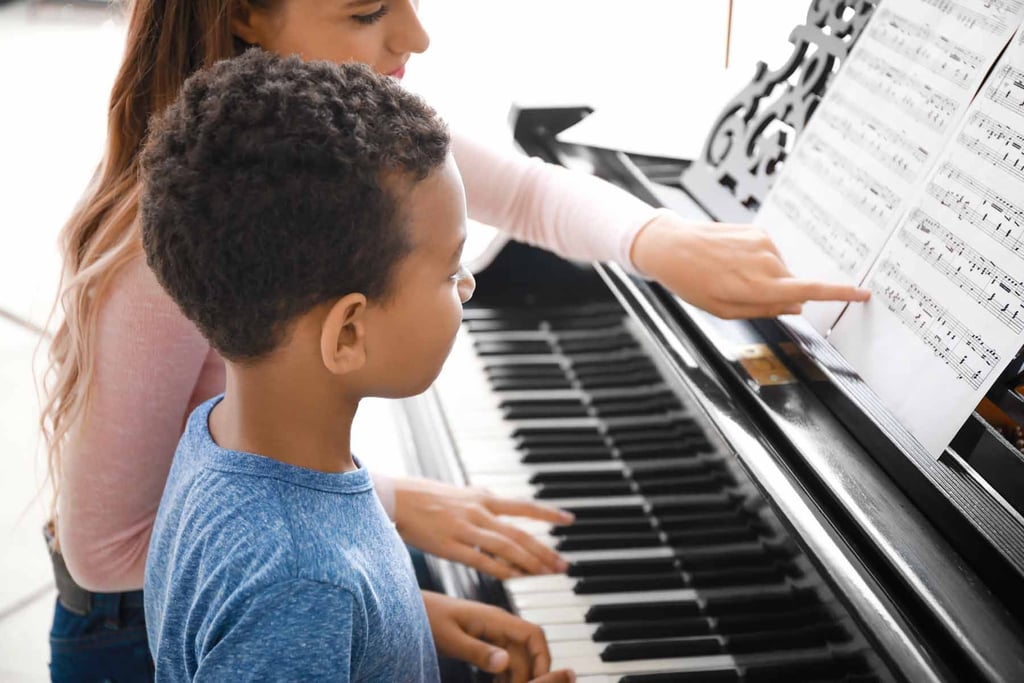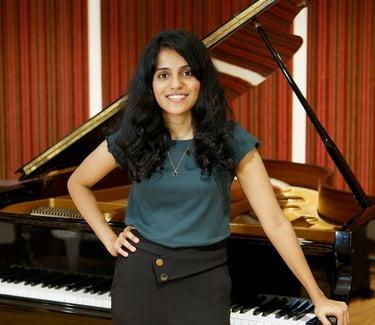What Progress Really Looks Like in Music Lessons
Is your child making real progress in piano lessons? Or are you a student wondering why things feel slow? This blog breaks down the truth about learning music - why progress isn’t always linear, what invisible wins really matter, and how to spot the milestones that often get overlooked. Packed with encouragement, expert tips, and practical tools, it’s a must-read for both students and parents navigating the musical journey together.
MUSIC EDUCATIONPARENTAL INVOLVEMENTSKILL DEVELOPMENT
What Progress Really Looks Like in Music Lessons
“She’s been learning piano for almost eight months… shouldn’t she be playing full songs by now?”
“I’ve been practicing every day, but I’m still messing up in the left hand!”
Sound familiar? Whether you're a parent peeking into your child’s lesson or a student wondering if you're “getting anywhere,” let’s bust a big myth: Musical progress is not a straight line. Some weeks you sprint ahead. Others feel like you’re crawling - or even standing still. But underneath it all, progress is always happening, even when you don’t see it right away. So let’s talk about what learning piano really looks like - and why the signs of success might surprise you.


🎯 The Myth of the Instant “Level-Up”
In movies, piano students sit down, play “Für Elise” perfectly, and cue applause. Real life is more like:
Week 1: Struggling to remember finger numbers
Week 3: Managing to play a five-note scale without looking
Week 5: Accidentally memorising “Mary Had a Little Lamb”
Week 8: Playing a short piece flawlessly - and grinning from ear to ear.
No fireworks. Just steady wins.
“Musical progress often happens silently, like roots growing underground. You don’t see it… until one day you bloom.” - Dr. Carol Dweck, an American Psychologist known for her work on motivation and mindset.
Progress isn’t just about mastering a song. It’s layered, like a cake. Here’s what you may not immediately notice, but absolutely counts:
1. Technical Growth
Improved finger strength and control
Better hand shape and posture
Smoother coordination between both hands
🎯 These are the building blocks. You can’t play beautifully without them.
2. Musical Understanding
Reading notes and rhythms fluently
Recognising patterns and intervals
Understanding time signatures, dynamics, and articulation
🎯 It’s like learning a new language - fluency builds over time.
3. Aural Development
Hearing mistakes and correcting them
Recognising chord qualities and intervals
Developing a musical “intuition”
🎯 These ear skills are essential - and often develop before you realise it.
4. Emotional and Personal Growth
Gaining confidence
Developing patience and grit
Handling performance nerves
Staying curious and motivated
🎯 These are the superpowers that last a lifetime - far beyond piano lessons.
🔍 What Real Progress Actually Looks Like
Spoiler alert: Plateaus are part of progress. When it feels like you’re not moving forward, your brain and body are actually syncing new information. Think of it like baking bread. Sometimes you just need to let things rise. When that happens:
Be kind to yourself
Stick to your practice routine
Try something new or easier for a change of pace
Remind yourself how far you’ve come
🚧 When You Hit a “Plateau”
Here are a few exciting (but often overlooked!) signs that a student is making real progress:
Playing with both hands independently
Reading a piece without help
Keeping a steady beat
Mastering a tricky rhythm
Playing confidently from memory
Choosing their own songs to learn
Not giving up when they hit a mistake
🎉 Each of these is a huge win worth celebrating.
📈 Visible Signs of Real Growth
Instead of focusing on how “fast” your child is progressing, look for these signs:
Are they enjoying music more each week?
Are they more confident sitting at the keyboard?
Are they developing better focus and patience?
Do they hum tunes, experiment, or ask musical questions?
Are they eager to show you something they learned?
🎯 If your child is growing in confidence and curiosity, they're thriving. And remember: the most powerful thing you can say is, “I’m proud of how hard you’re trying.” Not just “good job” when it sounds right.
👨👩👧 For Parents: What to Look For
Still feel stuck? Try this:
✅ Keep a Progress Log: Jot down what you practiced, what was easier, and what was tough. Look back after a month - you’ll see patterns of growth.
✅ Record Short Videos: Film yourself playing every 2–3 weeks. Watching these back is like a time-lapse of your improvement.
✅ Revisit Old Pieces: Play something from a month ago. Odds are, you’ll breeze through it now without breaking a sweat.
✅ Perform Often: Play for a pet, a sibling, or even a stuffed animal. The more you share your music, the more you’ll see your growth.
💪 For Students: How to Feel Your Progress
Everyone - everyone - hits bumps. Here’s what helps:
Change your routine: Try playing a new genre or doing ear training
Shorten your practice: 10 focused minutes > 40 distracted ones
Ask for feedback: Your teacher can adjust your path if you’re stuck
Take a short break: A reset can reignite motivation
Remember, you're not behind. You're just becoming.
🔄 When Progress Slows: Reset, Don’t Quit
🌱 Final Thought: Progress is a Journey, Not a Grade
Music is not a race to be won. It’s a relationship to be nurtured. Some students learn fast, some take their time. What matters most is that you’re still sitting at the piano - learning, growing, and expressing yourself. That’s real progress. So whether you're playing scales, learning your first pop song, or working on a tricky Bach piece...
👏 You're doing beautifully.
Share this on:
About The Author


Padmavathy Divakaran is a distinguished pianist, arranger, and music educator, currently serving as the Director of Aum Piano Studio. Formerly the representative for MTB Exams in Tamil Nadu and Karnataka - a globally recognised music education board based in the UK - she has consistently championed excellence in music education. Padmavathy holds a BA (Honours) in Music from Middlesex University, London, and a Diploma in Higher Education – Music from KM College of Music and Technology, Chennai. Her outstanding talent has been recognised through multiple scholarships and awards, including those presented by Dr. A.R. Rahman. As a performer, she has showcased her versatility across classical and contemporary genres, playing with orchestras in both London and Chennai. She was a core member of the Roliwood Seaboard Ensemble, playing a key role in the global launch of the ROLI Seaboard. Her artistry has earned her the honour of performing at prestigious events, including a special performance for Prince William, Simon Cowell, and other notable personalities at The Founders Forum in the UK - a testament to her global reach and artistic impact.